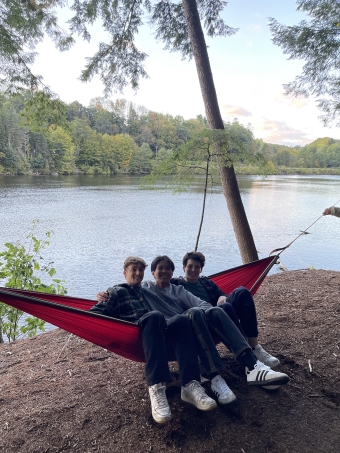

Matt Catrambone


Developing a Work-Life Balance
What's up! I can't believe I'm already moving into my third week of classes at Dartmouth. I've been settling in more and more each week, locating some go-to study spots and coffee shops and calculating the exact time it takes to get to each class from my dorm near the Connecticut River. One thing I'm still trying to master, though, is a work-life balance that prioritizes my academics, social life, and most importantly, my mental health. In light of recent events at Dartmouth, I've realized now more than ever before how necessary it is to put yourself first. So, I'm going to share how I'm working towards this balance.

My first tip is to simply try things to better understand what environment works best for you. In high school, I did most of my work at home, so I didn't know what is best for me in terms of how and with whom I worked. After spending time in the library, cafés, and my room, I've found that when I have assignments with definitive tasks (like a problem set) I work best in groups, but if I have some reading, I'll head up to 3FB (3rd Floor Berry) which is a quiet spot in the library with a pretty view of the northern part of campus. And sometimes, if I need motivation, I'll work alongside friends or leave my phone at the bottom of my backpack.
At the same time, though, I've found that when I can't focus anymore, I need to listen to my body and take a break. Acknowledging these cues is important for your mental health and allows you to reset in whatever way works for you. I've been trying a lot of different things: running in Pine Park with my favorite playlist, going on a walk to a dining hall or café, working out at the Alumni gym, or hanging out with friends outside. Then, when I get back to my assignments, I'm more focused and efficient which allows me to use my day for things other than schoolwork.
I'll end with a few final types that may help alleviate stress. For organization, I recommend keeping a calendar that includes all of your assignments, extracurricular activities, and (possibly) time-blocking which allows you to section off certain hours in the day for certain tasks, like studying or napping. This way, you can finish your assignments during the day or block them out for following days, so you don't have to worry about them when you are spending time with friends. I've also found it useful to find good study groups for your different classes, so you can have people to keep you company.
It's important to note, though, that everyone has their own routine and different habits. Overall, Dartmouth has a great set of resources to take advantage of such as teaching fellows in classes who can help with study habits, meditation and wellness events, and counseling at the Student Wellness Center. The Dartmouth community is always here for you!
Posts You Might Like

Having grown a little more accustomed to the single-digit temperatures in Fahrenheit, I decided to spend my three-day weekend participating in a campus-wide snowball fight.



Dartmouth offers a variety of study abroad programs. In this post, I interviewed a member of the class of 2027 who went on the ASCL Chinese LSA+ during the summer of 2024.


You have to see it to believe it—my Winter Carnival scrapbook


Winter Carnival kicked off this weekend with an opening ceremony straight out of Jurassic Park!


I recently attended an opening reception for a photography exhibition by Cara Romero at the Hood Museum of Art. Read on to learn more.


A quick review of common ways to get to Dartmouth!


The Lunar New Year festivities continue! Here's a photo gallery of Korean Student Association, Malaysian Student Association, and Vietnamese Student Association's celebrations!


"Only three classes?!" The typical response I get from someone outside of Dartmouth. Come and join as I describe how those three classes actually feel in a ten week term!

